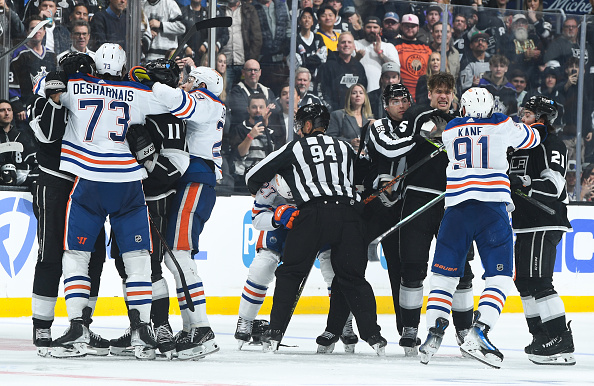Dr. Conrad Murray, Michael Jackson's personal physician, was taken into custody Monday following his conviction in the death of his superstar patient after a six-week trial that exposed a series of crucial missteps in the moments leading to Jackson's death and at times reduced the defendant to tears.
Conrad Murray Trial: Testimony Timeline, Who's Who, Juror Profiles
The seven-man, five-woman jury handed down the conviction after 22 days of testimony from nearly 50 witnesses in the long-awaited trial in connection with Jackson's June 25, 2009 death. Jurors deliberated for a full day Friday and part of the day Monday before reaching a verdict.
Prosecutors asked that Murray be taken into custody immediately, and the judge agreed.
"This is not a crime involving a mistake of judgment," said Judge Michael Pastor. "This was a crime where the end result was the death of a human being. That factor demonstrates rather dramatically that the public should be protected."
Sentencing is scheduled for Nov. 29.
A crowd of more than 100 Jackson supporters -- many carrying signs demanding "justice for Jackson" -- cheered outside the downtown Los Angeles courthouse when the verdict was read at about 1:20 p.m PT.
Murray, 58, stared forward, displaying no significant visible reaction. A shriek could be heard in the courtroom, followed by a hush.
Local
Get Los Angeles's latest local news on crime, entertainment, weather, schools, COVID, cost of living and more. Here's your go-to source for today's LA news.
Murray, seated between his two attorneys at a table, was immediately placed into handcuffs after the judge's decision. As he was escorted from the courtroom, the doctor looked to his left and waived at his girlfriend, Nicole Alvarez, who testified during the trial.
Jackson's family members were seated in the courtroom. The megastar's sister, La Toya, sobbed as the verdict was announced.
About an hour after the verdict was announced, La Toya Jackson tweeted, "VICTORY!!!!!!"
"Our sympathies go out to the Jackson family for their loss -- not a pop icon, but a son and a brother," Deputy District Attorney David Walgren said after the verdict was announced.
Prosecutors presented more than 30 witnesses in an attempt to show that Murray administered the surgical sedative propofol, then failed to properly monitor his 50-year-old patient. A prosecution expert on the drug told jurors that the King of Pop would be alive today were it not for critical mistakes committed by Murray, including the administration of the drug as a sleep aid at Jackson's rented Holmby Hills mansion.
Walgren began his closing argument Thursday by saying Murray violated "a relationship of trust with Michael Jackson." Walgren frequently mentioned Jackson's children during his closing argument.
"The evidence in this case is overwhelming," said Walgren. "It is abundantly clear that Conrad Murray acted with criminal negligence, that Conrad Murray caused the death of Michael Jackson, and that Conrad Murray left Prince, Paris and Blanket without a father.
"For Michael's children, this case will go on forever because they do not have a father. They do not have a father because of the actions of Conrad Murray."
Defense attorneys attempted to show that Jackson was to blame for his own death. They claimed the singer self-administered the fatal dose of propofol and failed to tell his doctor that he also ingested the drug lorazepam, creating what the defense called a "perfect storm" of drugs in his system.
A series of former patients characterized Murray as a caring doctor who was not motivated by financial gain. The defense tried to show that Murray was attempting to wean Jackson off propofol.
But it was the defense's own propofol expert who provided some of the most damaging testimony against Dr. Murray.
"Without careful bedside monitoring, it could be dangerous,'' Dr. Paul White said when asked whether it would be extremely dangerous to administer propofol with an IV drip in a bedroom for about two months.
White was asked whether he has ever heard of someone adminstering the drug in a bedroom prior to Jackson's case.
"No, I have not," White said.
Although jurors did not hear directly from the Houston-based cardiologist, some of the trial's most compelling moments came when the deputy district attorney played an audio recording of Murray's interview with detectives two days after Jackson's death. Murray provided his account of the final hours of Jackson's life, describing how Jackson pleaded for something to help him sleep after a late rehearsal for his planned "This Is It" concert series in London.
Jurors also heard from Jackson during the trial when prosecutors played an audio recording of the King of Pop that was taken from Murray's phone. Walgren reminded jurors of that recording during closing arguments. Jackson, his speech slow, slurred and barely intelligible, talked about his plans to amaze his fans with the concerts and open a children's hospital after the tour.
"Michael had plans, and hopes and dreams," Walgren said, adding that Murray ordered a large shipment of propofol two days after hearing the recording.
Murray faces up to four years in prison and loss of his medical license. The judge has discretion to decide the sentence, but he will receive recommendations from a probation department report and both attorneys.
It's unlikely that Murray will spend time in state prison becaues of AB109, California's prison realignment bill intended to address prison overcrowding. He would probably do time in county jail, possibly even serving a term of house arrest.
Follow NBCLA for the latest LA news, events and entertainment: Twitter: @NBCLA // Facebook: NBCLA



